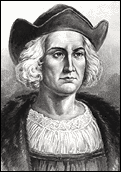Columbus Day Timeline

The first commemoration of Columbus took place in 1792
by Borgna Brunner
| 1792 | The first celebration commemorating Christopher Columbus's landing in the New World takes place in New York City on the 300th anniversary of his arrival. It was organized by the Society of St. Tammany, or the Columbian Order, widely known as Tammany Hall. |
| 1860s |  Italian immigrants in New York (1866) and in San Francisco (1869) commemorate Columbus Day as a celebration of their ethnic heritage. The celebration of Columbus—an Italian who sailed under the Spanish flag--remained a celebration limited to the Italian community for many decades. Most Americans viewed their history as stemming from Britain, and did not identify with earlier explorations of the New World. |
| 1892 | President Benjamin Harrison issues a presidential proclamation on the 400th anniversary of Columbus' first voyage, urging Americans to commemorate the day as a holiday. The Pledge of Allegiance is recited publicly for the first time during the celebration. |
| 1905 | Colorado becomes the first state to officially observe the holiday. |
| 1937 | President Franklin Roosevelt proclaims Oct. 12 as Columbus Day. |
| 1968 | President Lyndon B. Johnson declares Columbus Day a federal public holiday, to be celebrated on the second Monday in October, rather than on Oct. 12. The new Uniform Monday Holiday Act goes into effect in 1971. |
| 1980s | Historians, activists, and American Indians question Columbus's status as an icon in American history, rejecting the Eurocentric view that Columbus "discovered" America—the land had been populated by native peoples for millennia. |
Related Links |
- More from Columbus and Other Explorers
